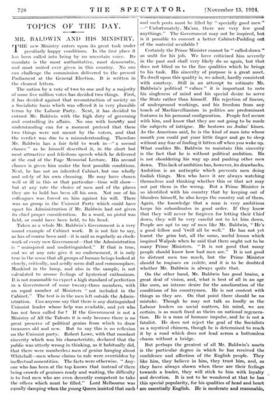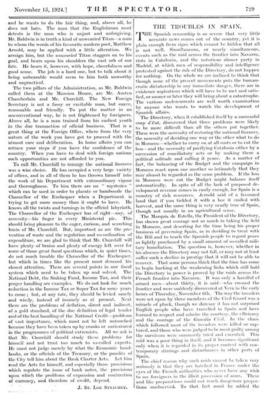Topics OF THE DAY.
MR. BALDWIN AND HIS MINISTRY.
rrHE new Ministry enters upon its great task under peculiarly happy conditions. In the first place it has been called into being by no uncertain voice. Its mandate is the most authoritative, most democratic, and most united ever given in this country. No one can challenge the commission delivered to the present Parliament at the General Election. It is written in the clearest letters.
The nation by a vote of two to one and by a majority of some five million votes has decided two things. First, it has decided against that reconstruction of society on a Socialistic basis which was offered it in very plausible terms by the Labour Party. Next, it has decided to entrust Mr. Baldwin with the high duty of governing and controlling its affairs. No one with honesty and understanding can for a moment pretend that these two things were not meant by the voters, and that the verdict was due to a misunderstanding. Therefore Mr. Baldwin has a fair field to work in—" a second chance " as he himself described it, in the short but most attractive and felicitous speech which he delivered at the end of the Page Memorial Lecture. His second chance is given him under the best possible conditions. Next, he has not an inherited Cabinet, but one wholly and solely of his own choosing. He may have chosen well or ill in this or that particular—time will show— but at any rate the choice of men and of the places they are to hold has been all his own. Not one of his colleagues was forced on him against his will. There was no group in the Unionist Party which could have upset his Administration if Mr. Baldwin had not given its chief proper consideration. In a word, no pistol was held, or could have been held, to his head.
Taken as a whole Mr. Baldwin's Government is a very sound example of Cabinet work. It is not fair to say, as has of course been said—it is said as regularly as clock- work of every new Government—that the Administration is " uninspired and undistinguished." If that is true, and we at any rate give it no endorsement, it is only true in the sense that all groups of human beings looked at closely, critically, and acidly seem dull and commonplace. Mankind in the lump, and also in the sample, is not calculated to arouse feelings of hysterical enthusiasm. It is not reasonable to expect a high standard of perfection in a Government of some twenty-three members, with an equal number of Ministers " not included in the Cabinet." The test is in the men left outside the Admin- istration. Can anyone say that there is any distinguished Unionist leader whose help was available, and yet who has not been called for ? If the Government is not a Ministry of All the Talents it is only because there is no great preserve of political genius from which to draw treasures old and new. But to say this is no reflexion on the Unionist party. Robert Lowe, with that mordant sincerity which was his characteristic, declared that the public was utterly wrong in thinking, as it habitually did, that there were numberles3 men of genius hanging about Whitehall—men whose claims to rule were overridden by ineffectual nonentities. The facts were otherwise. " Any- one who has been at the top knows that instead of there being crowds of geniuses ready and waiting, the difficulty is to find men who are even decently competent to take the offices which must be filled." Lord Melbourne was equally damping when the young Queen insisted that such and such posts must be filled by " specially good men " —" Unfortunately, Ma'am, there are very few good any-things." The Government may not be inspired, but is it possible to concoct a better Cabinet-Pudding out of the material available ?
Certainly the Prime Minister cannot be " called-down " as unfit for his job. We have criticized him severely in the past and shall very likely do so again, but that does not blind us to the fine qualities which he brings to his task. His sincerity of purpose is a great asset. To dwell upon this quality is, we admit, hardly consistent with courtesy. Still in an attempt to estimate Mr. Baldwin's political " values " it is important to note his singleness of mind and his special desire to serve the State rather than himself. His rejection of finesse, of underground workings, and his freedom from any touch of Machiavellianism in politics are predominant features in his personal configuration. People feel secure with him, and know that they are not going to be made the subjects of intrigue. He bestows no Judas' kisses. As the American said, he is the kind of man into whose mouth you could put your little finger and go to sleep without any fear of finding it bitten off when you woke up. What enables Mr. Baldwin to maintain this sincerity is the fact that he is without political ambition. He is not shouldering .his way up and pushing other men down. This lack of ambition has, however, its drawbacks. Ambition is an antiseptic which prevents men doing foolish things. Men who have it are always watching themselves and thinking whether this or that act may not put them in the wrong. But a Prime Minister is so identified with his country that by keeping out of blunders himself, he also keeps the country out of them. Again, the knowledge that a man is very ambitious keeps his subordinates in good order. If they know that they will never be forgiven for letting their Chief down, they will be very careful not to let him down. People are apt to say of men like Mr. Baldwin, " He's a good fellow and 'twill all be well." He has not yet learnt the grim but, all the same, useful lesson which inspired Walpole when he said that there ought not to be many Prime Ministers. " It is not good that many people should know how bad men are." It is not good to distrust men too much, but the Prime Minister should be toujours en vedette, and it is to be doubted whether Mr. Baldwin is always quite that.
On the other hand, Mr. Baldwin has good brains, a great deal of vision, and, what is best of all in an age like ours, an intense desire for the amelioration of the conditions of his countrymen. He is not content with things as they are. On that point there should be no mistake. Though lie may not talk as loudly as the Labour leaders on social matters, his mind, we are certain, is as much fixed as theirs on national regenera- tion. He is a man of humane impulse, and he is not a fatalist. He does not reject the goal of the Socialists as a mystical chimera, though he is determined to reach it by a road which does not lead across a bottomless chasm without a bridge.
But perhaps the greatest of all Mr. Baldwin's assets is the particular degree in which he has received the confidence and affection of the English people. They like him, they believe in him, they trust him, and, as they have always shown when these are their feelings towards a leader, they will stick to him with loyalty and devotion. It is not to be wondered at that he has this special popularity, for his qualities of head and heart are essentially English.. He is moderate and reasonable, and he wants to do the fair thing, and, above all, he does not hate. The man that the Englishman most detests is the man who is unjust and unforgiving.
Mr. Baldwin is in truth a kind of unwearied Titan—a man to whom the words of his favourite modern poet, Matthew Arnold, may be applied with a little alteration. We arraign him, but the unwearied Titan staggers on to his goal, and bears upon his shoulders the vast orb of our fate. He bears it, however, with hope, cheerfulness and good sense. The job is a hard one, but to talk about it being unbearable would seem to him both unworthy and unpractical.
The two pillars of the Administration, as Mr. Baldwin called them at the Mansion House, are Mr. Austen Chamberlain and Mr. Churchill. The New Foreign Secretary is not a fussy or excitable man, but suave, reasonable and friendly. To put the matter in an unconventional way, he is not frightened by foreigners. Above all, he is a man trained from his earliest youth in the due transaction of official business. That is a great thing at the Foreign Office, where from the very nature of the work you have got to proceed with the utmost care and deliberation. In home affairs you can retrace your steps if you have the confidence of the country. When you have to deal with foreign nations such opportunities arc not afforded to you.
To call Mr. Churchill to manage the national finances was a wise choice. He has occupied a very large variety of offices, and in all of them he has thrown himself into the work of his Department with extraordinary vigour and thoroughness. To him there are no " mysteries " which can be used in order to placate or bamboozle the Chancellor of the Exchequer when a Department is trying to get more money than it ought to have. He knows all the twists and turnings in the official labyrinth. The Chancellor of the Exchequer has of right—nay, of necessity—his finger in every Ministerial pie. This should bring pleasure to the eager, curious, and searching brain of Mr. Churchill. But, important as are the pre- vention of waste and the regulation and co-ordination of expenditure, we are glad to think that Mr. Churchill will have plenty of brains and plenty of energy left over for some of those great fiscal questions which, in quiet times, do not much trouble the Chancellor of the Exchequer, but which in times like the present must demand his closest attention. There are several points in our fiscal system which need to be taken up and solved. The National Debt, the Sinking Fund, Income Tax, and their proper handling are examples. We do not look for much reduction in the Incoine Tax or Super Tax for some years to come ; but, at any rate, they should be levied sanely and wisely, instead of insanely as at present. Next there are the problems of deflation, direct and indirect, of a gold standard, of the due definition of legal tender and of the best handling of the National Credit—problems of vast importance, which must not be left untouched because they have been taken up by cranks or caricatured in the programmes of political extremists. All we ask is that Mr. Churchill should study these problems for himself and not trust too much to so-called experts. He must not judge merely by what the Economic hand- books, or the officials of the Tredsury, or' the pundits of the City tell him aboUt the Bank Charter Acts. Let him read the Acts for himself, and especially those provisions which regulate the issue of bank notes, the provisions upOn which the problems of expansion and contraction of currency, and therefore of credit, depend.
J. ST. LOE STRACHEY.











































 Previous page
Previous page